|
June 20, 2013 - No. 76
Fight for the Rights of All
Quebec Construction Workers Launch
General Strike
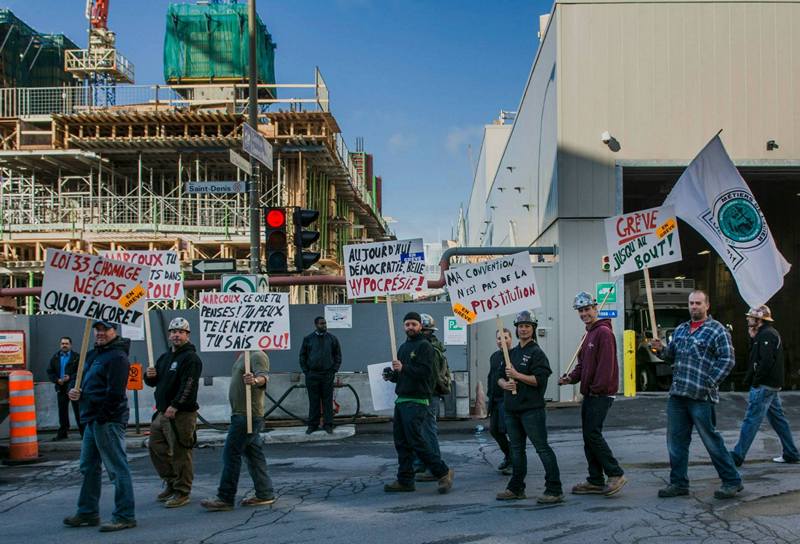 Montreal, June 17,
2013
Montreal, June 17,
2013
Fight
for
the Rights of All
• Quebec Construction Workers Launch General
Strike - Pierre Chénier
• Workers Reject Concessions and Defend Their
Dignity - Interview, Yves Ouellet, Spokesman, Construction
Trade Union Alliance
• End Air Canada's Pension Blackmail
- New Horizons
• Second National Day to Uphold Refugees' Right
to Health Care
Fight for the Rights of All
Quebec Construction Workers Launch
General Strike
- Pierre Chénier -
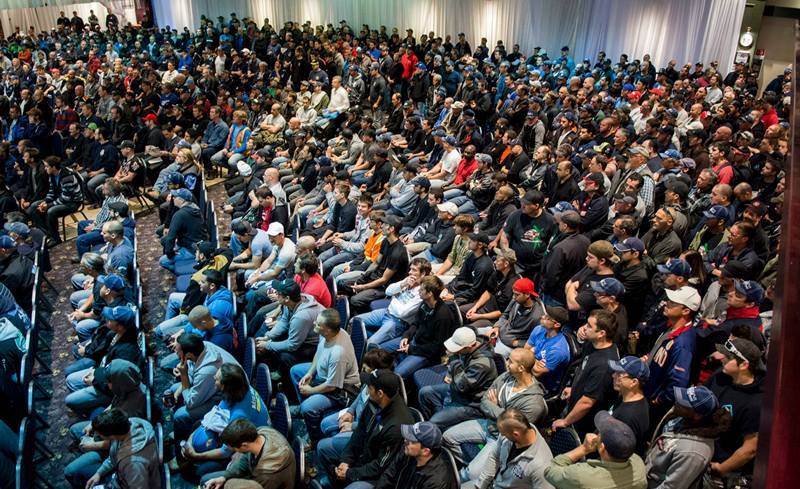 The Construction Trade
Union
Alliance launches strike, June 17, 2013 in Montreal.
The Construction Trade
Union
Alliance launches strike, June 17, 2013 in Montreal.
On June 17, in the face of attacks on their wages and
working
conditions, the nearly 175,000 construction workers in Quebec proceeded
with a general strike affecting all construction sites in every sector
of the industry: industrial, institutional/commercial, residential and
civil/road engineering. Picket lines have been set up at major
construction projects across Quebec.
The strike is directed at the employers' unacceptable
demands
for concessions, especially from the Construction Association of Quebec
that represents the institutional/commercial and industrial sectors.
The strike also seeks to satisfy demands on wages and compensation for
travel expenses, which can reach as high as 100 kilometres or more per
day. The
concessions demanded by employers include changing the time slots when
workers must be available for work, working at straight time on
Saturday to replace any hours lost during the week due to bad weather,
reducing double-time to straight time for the first eight hours of
overtime and the demand to increase the mobility of workers across the
province rather than hire local workers.
These workers create immense value in the socialized
economy
and are at the heart of the construction of infrastructure and major
public institutions, including for education and health care, as well
as large industrial and commercial establishments and for other sectors
of the economy. Their role is not recognized by the employers and the
authorities responsible. Besides demanding concessions, these forces
are permitting the degeneration of health and safety conditions on
construction sites where injuries and deaths are considered inevitable
collateral damage.
 The construction workers are
demanding wages and working conditions commensurate with the work they
do, and that health and safety conditions be improved. Workers in
Quebec and across Canada should strongly support the construction
workers and their demands in whatever way possible. The construction workers are
demanding wages and working conditions commensurate with the work they
do, and that health and safety conditions be improved. Workers in
Quebec and across Canada should strongly support the construction
workers and their demands in whatever way possible.
The big construction monopolies seek to degrade the
working
conditions of construction workers as other monopolies are doing to
workers in other sectors. They justify this based on the
capital-centred view that workers, who produce all the wealth, are
merely a cost of production, and thus the companies require concessions
to give them flexibility under so-called unconventional situations.
Construction workers are considered the cause of economic hardship for
the monopolies while attacking them is supposedly working for the
future of the industry.
Consider the comments made during the Employers Council
press
conference on June 11:
"As the global aluminum industry is in a critical phase
around
the world, with the price of aluminum below the average cost of
production and unprecedented inventories, the Quebec industry, already
affected by energy costs, now among the highest in the world, cannot
afford to add to this uncertainty by increasing construction costs
already exceeding the global average," said Jean Simard, CEO of the
Aluminum Association of Canada.
 Likewise, Josée
Méthot, CEO of the Mining Association of Quebec, stated: "We
very much hope that the parties will agree and the proposals to be
adopted will reflect the reality of our members who have to deal with
unconventional situations, especially for the development of projects
in Northern Quebec. In effect, the Quebec Mining Association believes
that new agreements should allow for flexibility, particularly in terms
of working hours. Our industry operates in a world where the scheduled
40 hours per week, Monday to Friday, are not always possible. Our
projects often take place in very remote areas and this must be taken
into account in the negotiations. Likewise, Josée
Méthot, CEO of the Mining Association of Quebec, stated: "We
very much hope that the parties will agree and the proposals to be
adopted will reflect the reality of our members who have to deal with
unconventional situations, especially for the development of projects
in Northern Quebec. In effect, the Quebec Mining Association believes
that new agreements should allow for flexibility, particularly in terms
of working hours. Our industry operates in a world where the scheduled
40 hours per week, Monday to Friday, are not always possible. Our
projects often take place in very remote areas and this must be taken
into account in the negotiations.
"Unconventional situations" have been invoked for a long
time
to attack the just demands of construction workers and to degrade their
working conditions. The same pretext is used to prepare conditions for
the de-unionization of the industry.
This despicable attempt to lower the standards of living
and
work of these workers is part of the anti-social offensive of the rich
against the workers, and their defence organizations. Workers should
support the just struggle and strike of the construction workers on the
basis that doing so also defends their own interests -- our security
lies in the fight for the rights of all.
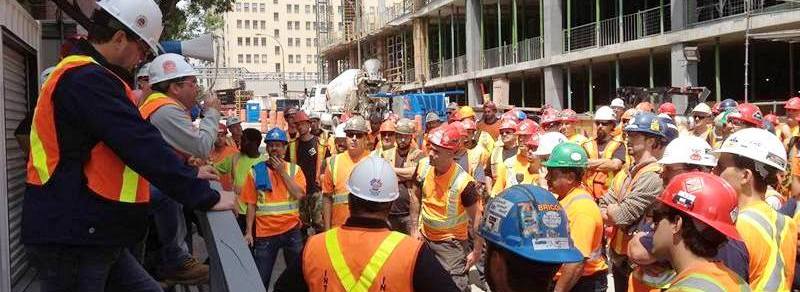 Union representatives
recently
toured Quebec construction sites to give workers an update on
negotiations.
Union representatives
recently
toured Quebec construction sites to give workers an update on
negotiations.
All Out to Support
the
Quebec Construction Workers!
Employers Must Immediately Withdraw Demands for Concessions and
Meet the Workers' Demands!

Workers Reject Concessions and
Defend Their Dignity
- Interview, Yves Ouellet, Spokesman,
Construction Trade Union Alliance -
TML: What are the main issues in this
conflict?
Yves Ouellet: Two months ago the
employers
filed their demands. The Construction Association of Quebec (ACQ)
demanded a whole series of concessions. Other employers' associations
also had demands. Those fell away quietly one after the other, but not
those of the ACQ.
One of these concessions is to extend the time slot for
the
workday which is currently from 6:30 am to 5:00 pm, to 5:30 am to 7:00
pm. They aren't asking us to work more hours per week but to work our
hours within these hours. It doesn't make sense. We have demands for a
balance between work and family life but they want to bring in our
members at 5:30 am in order to be more productive. Quebec construction
workers are among the most productive in the world. They are also human
beings in their own right who have families and who are entitled to a
family life.
They also asked us to give up being paid the first eight
hours
of overtime at double-time and receive time-and-a-half instead. They
are demanding increased provincial mobility, to bring a greater number
of workers across Quebec into regions other than their own. We told
them no, we will not sacrifice our workers in the regions. They
demanded that if time is lost due to bad weather during a weekday that
our workers make it up on Saturday at straight time. Now they say it
could be done on a voluntary basis. In the construction industry,
there's no such thing as voluntary. They will tell the worker, "If you
don't come on Saturday, don't come back."
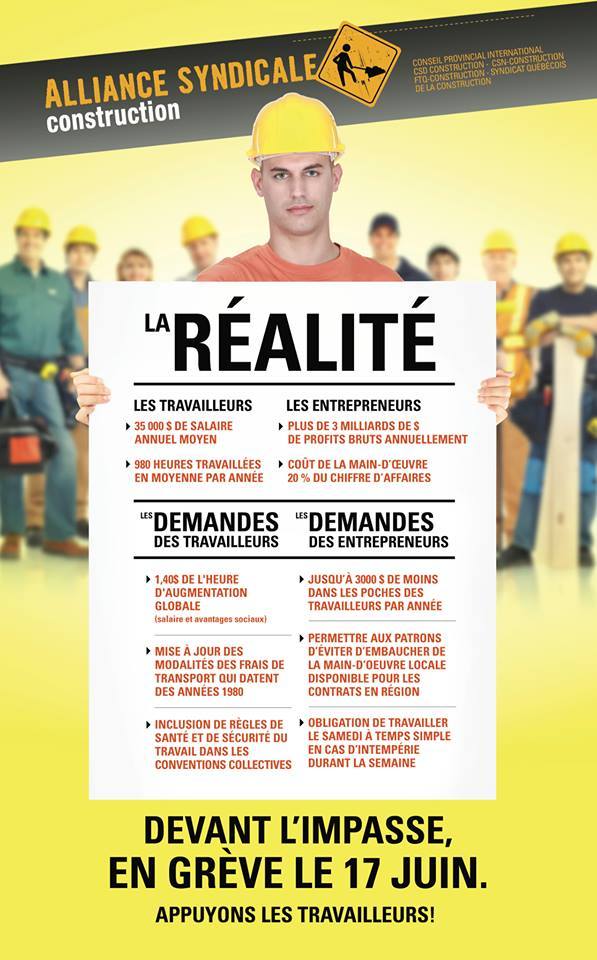 TML: How did it go at the
negotiating table? TML: How did it go at the
negotiating table?
YO: We've been negotiating for two
months. In
early May, the mediators appointed by the Labour Minister [Agnès
Maltais] decided not to extend their mandate. The Minister then said
she would still give us mediators at the table, this time as
facilitators to assist with negotiations. The ACQ said no and instead
of negotiating it conducted a tour to get a lockout mandate. During
that time there wasn't always an offer on the table. The ACQ's first
offer was obtained Saturday, [June 15] 36 hours before the June 17
deadline. We were offered something in the range of a one per cent wage
increase per year! It's a total lack of respect. In the
institutional/commercial sector, we were told that if we accept
concessions they would offer us one per cent, 1.6 per cent and two per
cent per year. Take it or leave it.
We told them that our workers had already voted 90 per
cent
for a strike mandate against these concessions and that their offer was
not a basis for negotiation. So we told them to call us when they had
something acceptable to the workers to put on the table. It is clear
they wanted us to go on strike -- it was either accept the concession
or there is no deal.
TML: You are both fighting against
concessions and making demands that will improve wages and working
conditions.
YO: We want our workers to maintain
their
purchasing power. We want to look at the issue of expenses. Our problem
is that our workers can change worksites dozens of times in a year,
they can't move to be near their place of work. It is common for us to
have to drive more than 100 km every day to get to work and back.
The point to be understood is that we could not
negotiate with
the employers. For them, it is either accept concessions or else there
is no negotiation, no agreement.
The employers were told to forget their grocery list of
concessions. What we have, we negotiated in previous years, no doubt in
exchange for something else at that time. They took what we gave them
and now they want to take back what we won in exchange. It's a total
lack of respect for workers.
TML: What do you want to say in
conclusion?
YO: We're facing the right-wing, without
a
doubt. Perhaps they see this as a good opportunity for them because
they say that if we strike we will harm the image of the construction
industry, that the industry's image is already in bad shape and that
we'll make it worse with a strike. Maybe we don't watch the same
television but when I listen to the Charbonneau Commission
[investigating corruption in the construction industry] I don't see any
workers. It's not workers who are hurting the industry's image. We are
told that a strike will harm the image and be costly to the industry,
but there has been hundreds of millions of dollars in fraud and it is
not the workers who committed this fraud. They try to blame the
workers. These people are so arrogant they never feel guilty about
anything.
This is an important struggle in which we are engaged.
We're
no longer dealing with negotiations. Now what they want is to take what
we have. They're demanding concessions and it's not just in the
construction industry -- we see it all across Quebec and Canada. They
want to break collective agreements and make the workers out to be
thieves. According to them, negotiations mean imposing concessions on
us. We cannot let it pass. We are not just fighting for ourselves.

End Air Canada's Pension Blackmail
- New Horizons* -
Blackmail: to extort
money
from (a person) by the use of threats. - Dictionary.com
Employees at Air Canada are becoming increasingly
concerned
about the state of Air Canada's pension plans and, of course, by
extension about their right to a secure and dignified retirement. The
uncertainty has been fuelled by Air Canada's public statements and the
monopoly media campaign against any defined benefit pensions that have
been won by the workers over the years in exchange for sacrificing
their immediate share of the added value they produce. If we look at
Air Canada's history of dealing with the employees' pensions, there is
little evidence to defend its proclamations of concern about the
sustainability of the pensions.
Air Canada Workers and Retirees Must Organize to Defend
Our
Pensions
For several years now, a climate of uncertainty and
insecurity
has reigned over the question of pensions at Air Canada. Much ink was
spilled
about the recent letter from federal Finance Minister Jim Flaherty
granting Air Canada another extension to its "deadline" for ending the
underfunding of the pension plans. However, before we look at this
"agreement," we will take a few minutes to look at how the Company has
dealt with this matter over the past few years.
Air Canada's proclamations of concern about the
sustainability
of the pensions and, of course, the well-being of active employees and
our retired colleagues don't seem to have been backed up with concrete
actions over the past nearly two decades. In fact, one could say the
opposite holds true.
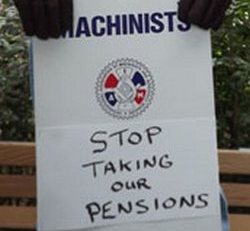 According to a 2005 study on
"The Impact of Employer
Contribution Holidays on the Funding of Defined Benefit Pension Plans,"
"Between 1994 and 2003 -- even after Air Canada knew of its financial
crisis -- the corporation took between one and three contribution
holidays for each of its six plans. In the worst case, the company took
contribution holidays in 1999, 2000 and 2003 totaling $24.3 million
with respect to one plan with a critical funding deficit of 21 per cent. According to a 2005 study on
"The Impact of Employer
Contribution Holidays on the Funding of Defined Benefit Pension Plans,"
"Between 1994 and 2003 -- even after Air Canada knew of its financial
crisis -- the corporation took between one and three contribution
holidays for each of its six plans. In the worst case, the company took
contribution holidays in 1999, 2000 and 2003 totaling $24.3 million
with respect to one plan with a critical funding deficit of 21 per cent.
"Contribution holidays between 1999
and 2001 plus lost interest would have offset the current deficit (referring
to
2005 - NH) by 17.83 per cent. This does not include the
additional holiday taken in 2003."
When Air Canada entered CCAA (Canadian
Companies' Creditors Arrangement Act), the blackmail against the
workers began. Under the threat of loss of both jobs and pensions,
workers at Air Canada were forced to accept upward of a billion dollars
in concessions to "save" the Company. The Company was restructured with
"the various business segments within the Air Canada group being
established as stand-alone entities," several of which were
subsequently sold off so that those who seized control of Canada's
national airline were able to make a big haul while relieving Air
Canada of any responsibility toward its former employees.
The collective agreement that had been forced upon CUPE
members at the time included a provision for a "wage re-opener." New
Horizons wrote at the time that it didn't necessarily mean we
would get
a wage increase. Sure enough the "raise" "granted" by the arbitrator
was, once again, well below inflation.
While a tiny handful were making big bucks at that time,
Air
Canada managed to convince the arbitrator that it was suffering a
severe disadvantage by having to compete with carriers who did not have
pension plans for their employees, and could certainly not be expected
to pay its employees wages commensurate with the important safety and
service jobs we perform. The Company's argument also indicated to us
that it would ultimately like to jettison any responsibility it has
toward the retirees and toward the active workers when they leave the
work force.
Office of the Superintendent of Finanacial Institutions
The Office of the Superintendent of Financial
Institutions
(OSFI) regulates federally registered pension plans such as those at
Air Canada. In 2004, the OSFI made an arrangement with Air Canada to
make annual special payments over a period of 10 years, ie up to
December 31, 2013, that would in theory have helped to wipe out the
"solvency deficiency." It should be noted that this deficiency is based
on a model that assumes Air Canada would cease operations today.
Unfortunately, here we are at the eleventh hour with the
"solvency deficiency" not only not having been wiped out but having
nearly quadrupled, with figures of upward of $4-billion dollars being
thrown around. However, total confusion on the question is maintained
through such means as this tidbit from the Air Canada June 10 press
release for the "Investor Day Conference" where it expresses its
direction for the coming period: "reduce solvency liabilities
(estimated at $1.1-billion based on 2012 valuations)."
In 2009, Air Canada won agreement from the government
for a
moratorium on making any special payments to reduce its pension deficit
through 2010, and then a cap on special payments that would rise from
$150-million in 2011 to $225-million in 2013. The Financial Post quotes Mr. Rovinescu
in his request to federal Finance Minister Jim Flaherty for a further
10 year extension of special payments with an annual cap of
$150-million as saying that the Company had "worked diligently to
address our pension solvency challenges" and that concessions made by
the unions "were expected to reduce liabilities by $1.2 billion."
"However, despite these significant and hard-fought achievements, the
stability and sustainability of our DB (defined-benefit) plans
continues to be threatened for reasons completely beyond the company's
control," he said.
The problem in eliminating the "deficiency" is blamed on
a
number of things, particularly on "low interest rates" leading to low
earnings on investments and on the anarchy in the "equity markets,"
where our pension monies were gambled away, losing millions. Of course,
the solution offered is not to call on the government to establish
higher interest rates or to call for a new direction for the economy
with planning that would eliminate the anarchy we experience now. It is
no surprise to learn that the "solution" offered is to demand that
workers give up a greater part of the added value we produce through
the services we provide to the economy.
Jim Flaherty pretends to take a tough line, granting Air
Canada only a seven year extension beginning in 2014, with a minimum
payment of $150-million a year, or an average of $200-million over the
seven years. In what the monopoly press calls "wielding a heavy stick"
executive compensation was linked to the special payments with a Globe
and
Mail article claiming that Mr. Flaherty imposed conditions
"limiting increases in executive pay to the rate of inflation, a
prohibition on special bonuses and limits on executive incentive
plans." We later learned that Mr. Flaherty granted that the executives
can receive their full incentive bonuses (cash amounts when the airline
meets its financial targets) if the Company makes the full $200-million
special payment and lesser amounts if they made more than the minimum
payment required. There is no word on what happens to executives' stock
options.
One question arises in this. Whatever happened to the
OSFI in
this story? Has this institution been supplanted by the Finance
Minister and executive Order-in-Council? However, more troublesome is
the fact that we have been informed that the government is encouraging
the Company to seize even more of the added value produced by its
employees while the Company executives can continue enriching
themselves. The CAW, CUPE, IAMAW Joint Statement on Air Canada Pension
Relief Announcement points out that "Unfortunately, Minister Flaherty
is also pushing Air Canada to seek, in the next round of negotiations,
provisions which would require employees to contribute 50% of pension
normal costs." We know from our experience during the 2011 negotiations
that the Harper dictatorship is prepared to take any action necessary
to support this and other corporations and impose unsustainable wages
and working conditions on the workers that will continue the downward
pressure on our lifestyle.
No Solution Has Been Provided
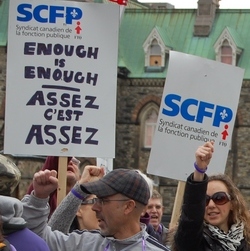 One thing that is very
clear is that this "relief"
provided by
the federal government does nothing to solve the problem. Not only has
the problem not been solved but the situation has actually deteriorated
under these same arrangements that were made in the past. We have
absolutely no reason to celebrate. One thing that is very
clear is that this "relief"
provided by
the federal government does nothing to solve the problem. Not only has
the problem not been solved but the situation has actually deteriorated
under these same arrangements that were made in the past. We have
absolutely no reason to celebrate.
They are a prolongation of the status quo, which will
allow
upper management and the handful of wealthy shareholders to continue to
reinforce their collaboration with their government to force us to give
up even more while they continue to blithely pocket an ever greater
share of the added value our work has produced.
It is urgent that we continue
organizing to break this sense of impotence in the face of this attempt
to steal our pension monies. We must work to ensure that public right
trumps monopoly right and to oppose the kind of agreements and
arrangements that are made using the blackmail that our very existence
depends on the survival of the Company that employs us. It is the
survival of the Company that depends on our well-being and on the
fulfillment of our common responsibility toward the current and future
retirees.
The refusal of the government and the various
corporations it
serves to take responsibility for the pension crisis shows that they
are incapable of directing the economy of this country in the interests
of the Canadian people. Their solution to every problem that arises is
to attack those who produce the wealth. This cannot continue. This is
our economy. The workers at Air Canada provide the services that are
required for our national carrier to exist. We are entitled to a
retirement with dignity and it is obvious that it is up to us to
determine how this can happen. We must fight to defend the pensions we
have and fight for pensions for everybody. We have no choice but to
strengthen the workers' opposition and establish a new direction for
the economy.

Second National Day to Uphold Refugees'
Right to Health Care
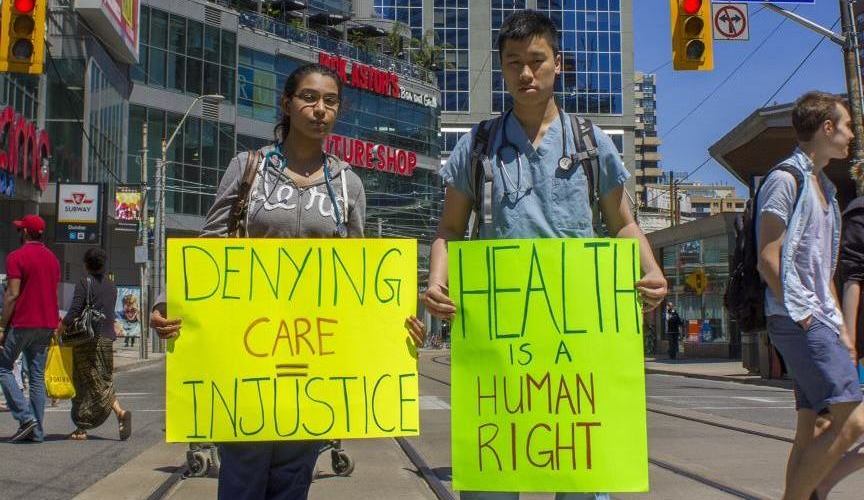 Doctors prepare for
national
day of action, Toronto, June 16, 2013.
Doctors prepare for
national
day of action, Toronto, June 16, 2013.
On June 17, Canadian Doctors for Refugee Care (CDRC)
held a
second National Day of Action to bring attention to the consequences of
the federal government's cuts to refugee health care and called on
everyone to join them to "show the Federal Government that Canadians
will stand up for the most vulnerable among us." Actions were held in
22 cities across the country including Victoria, Vancouver, Calgary,
Edmonton, Saskatoon, Winnipeg, Thunder Bay, Sudbury, Windsor, London,
Kitchener, Guelph, Hamilton, Toronto, Kingston, Ottawa, Montreal,
Halifax and St. John's.
A memo sent out to McGill University medical students
advising
them of the event explained the background to the day of action: "CDRC
was established in the spring of 2012 as an advocacy group singularly
focused on persuading the federal government to rescind severe cuts to
health care coverage for refugee claimants under the Interim Federal
Health program. CDRC is also a co-litigant in a Charter challenge to
the cuts. Prior to the cuts which took effect June 30, 2012 and since
1957, IFH provided insurance coverage to refugee claimants for the full
breadth of health services and medications and equivalent to that
received by people on welfare. CDRC seeks to reverse the cuts or change
them so that basic health benefits are restored to refugee claimants."
The memo gives a list of some 21 professional associations of those who
work in health care that are openly opposed to these cuts.

Calgary,
June 15, 2013
|
Despite stating that the medical school could not take a political
position on the cuts, the memo nonetheless pointed out the relevance of
students' participation as part of learning to advocate for their
patients. A similar memo was sent out at the University of Toronto
medical school and both schools made provisions for students to be
excused so as to participate in the event.
In the lead up to the day of action, the Facebook page
of CDRC
was filled with posts from doctors, medical students and health care
professionals from across Canada and around the world holding up
posters for the June 17 action to show their support and decry the
government's cuts to health care.
On June 13, CDRC issued a press release informing that
dozens
of prominent Canadian writers, actors, filmmakers and musicians had
signed a declaration calling on the federal government to reverse its
cuts to the Interim Federal Health Program.
"As a physician, and as a Canadian, it is unacceptable
to me
that refugees in need of health services are being denied care," said
award winning author Dr. Vincent Lam. "I stand proudly with my
colleagues in the medical and arts communities in calling on the
federal government to reverse these harmful cuts."
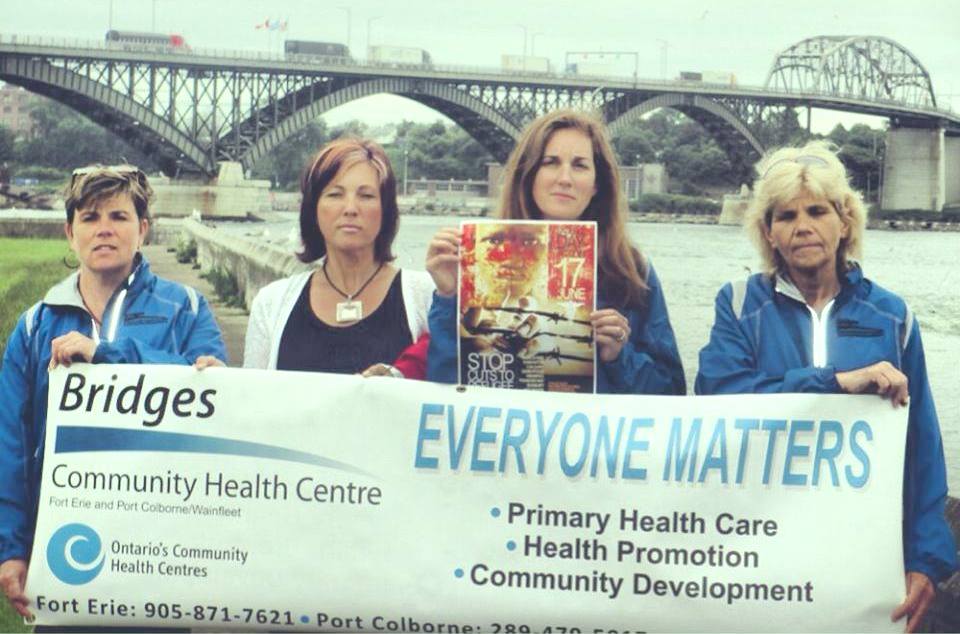 Fort Erie, June 11,
2013
Fort Erie, June 11,
2013
|
Among other signatories to the declaration are authors
Margaret Atwood, Yann Martel and Rohinton Mistry, actors Shirley
Douglas and Kiefer Sutherland, musician Jian Ghomeshi, and former
Governor General Adrienne Clarkson and her husband, writer John Ralston
Saul.
The declaration states in part: "Refugees arriving in
Canada --
many of whom are fleeing war, violence, or famine -- often come with
little more than the clothes they are wearing. Access to basic health
services is guaranteed to them under the Charter; care has been
provided because it is the right thing to do.
"Now, due to these cuts, many refugees -- future
citizens of
this country -- are being denied services, including children and
pregnant women. [...] The federal cuts have also sown confusion within
our health system, further restricting access to care for refugees and
resulting in unnecessary costs being borne by provincial governments.
"This is not the Canadian way.
"We call on the federal government to reverse these
health
cuts and restore our country's humanitarian tradition of providing care
to refugees."

Read The Marxist-Leninist
Daily
Website: www.cpcml.ca
Email: editor@cpcml.ca
|





 The construction workers are
demanding wages and working conditions commensurate with the work they
do, and that health and safety conditions be improved. Workers in
Quebec and across Canada should strongly support the construction
workers and their demands in whatever way possible.
The construction workers are
demanding wages and working conditions commensurate with the work they
do, and that health and safety conditions be improved. Workers in
Quebec and across Canada should strongly support the construction
workers and their demands in whatever way possible. Likewise, Josée
Méthot, CEO of the Mining Association of Quebec, stated: "We
very much hope that the parties will agree and the proposals to be
adopted will reflect the reality of our members who have to deal with
unconventional situations, especially for the development of projects
in Northern Quebec. In effect, the Quebec Mining Association believes
that new agreements should allow for flexibility, particularly in terms
of working hours. Our industry operates in a world where the scheduled
40 hours per week, Monday to Friday, are not always possible. Our
projects often take place in very remote areas and this must be taken
into account in the negotiations.
Likewise, Josée
Méthot, CEO of the Mining Association of Quebec, stated: "We
very much hope that the parties will agree and the proposals to be
adopted will reflect the reality of our members who have to deal with
unconventional situations, especially for the development of projects
in Northern Quebec. In effect, the Quebec Mining Association believes
that new agreements should allow for flexibility, particularly in terms
of working hours. Our industry operates in a world where the scheduled
40 hours per week, Monday to Friday, are not always possible. Our
projects often take place in very remote areas and this must be taken
into account in the negotiations.


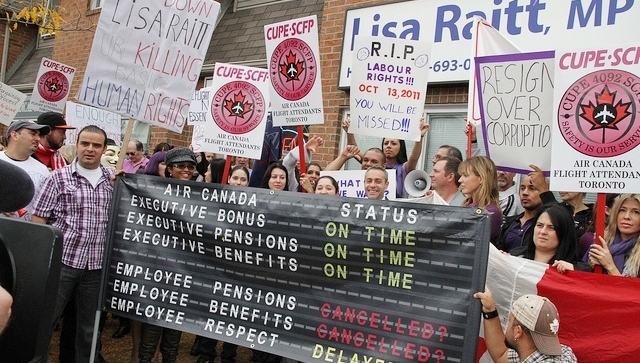
 According to a 2005 study on
"The Impact of Employer
Contribution Holidays on the Funding of Defined Benefit Pension Plans,"
"Between 1994 and 2003 -- even after Air Canada knew of its financial
crisis -- the corporation took between one and three contribution
holidays for each of its six plans. In the worst case, the company took
contribution holidays in 1999, 2000 and 2003 totaling $24.3 million
with respect to one plan with a critical funding deficit of 21 per cent.
According to a 2005 study on
"The Impact of Employer
Contribution Holidays on the Funding of Defined Benefit Pension Plans,"
"Between 1994 and 2003 -- even after Air Canada knew of its financial
crisis -- the corporation took between one and three contribution
holidays for each of its six plans. In the worst case, the company took
contribution holidays in 1999, 2000 and 2003 totaling $24.3 million
with respect to one plan with a critical funding deficit of 21 per cent. One thing that is very
clear is that this "relief"
provided by
the federal government does nothing to solve the problem. Not only has
the problem not been solved but the situation has actually deteriorated
under these same arrangements that were made in the past. We have
absolutely no reason to celebrate.
One thing that is very
clear is that this "relief"
provided by
the federal government does nothing to solve the problem. Not only has
the problem not been solved but the situation has actually deteriorated
under these same arrangements that were made in the past. We have
absolutely no reason to celebrate.